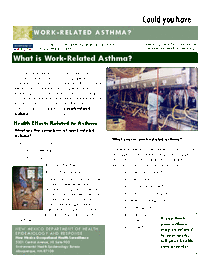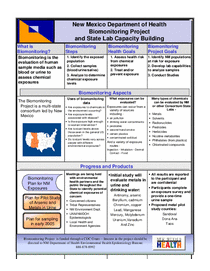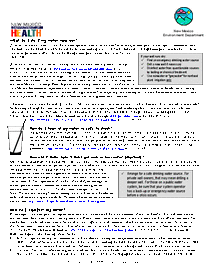Help
 Sexual Assault Fact Sheet
Sexual Violence Prevention - Help
May 5, 2009
Sexual Assault Fact Sheet
Sexual Violence Prevention - Help
May 5, 2009
This informative fact sheet explains what sexual assault is, how many women are victims of sexual assault, sexual assault in New Mexico, and where to go for help.
 Work-Related Asthma FAQ
Occupational Health Surveillance - Help
February 25, 2009
Work-Related Asthma FAQ
Occupational Health Surveillance - Help
February 25, 2009
This extremely helpful document answers many frequently asked questions about work-related asthma. It explains what work-related asthma is, the health effects related to asthma, what the symptoms are, what causes it, which workers can get it, what you can do if you think you have work-related asthma, and provides a number of helpful website resource links so you can learn more and protect yourself from work-related asthma.
 Sulfate in Drinking Water
Water Quality - Help
January 1, 2007
Sulfate in Drinking Water
Water Quality - Help
January 1, 2007
Sulfate usually occurs naturally in the groundwater in New Mexico because the water dissolves it out of rocks, such as gypsum. Natural levels can be increased by contamination from mines, mills, landfills, sewage and other man-made sources.
 Biomonitoring Fact Sheet
Biomonitoring Program - Help
January 1, 2004
Biomonitoring Fact Sheet
Biomonitoring Program - Help
January 1, 2004
Biomonitoring is the evaluation of human sample media such as blood or urine to assess chemical exposures. This document describes what biomonitoring is, the steps taken to analyze samples, health goals, project goals, and other aspects of the biomonitoring project including progress and products.
 Nitrate in Drinking Water
Water Quality - Help
September 1, 2003
Nitrate in Drinking Water
Water Quality - Help
September 1, 2003
Nitrate is a chemical compound made up of nitrogen and oxygen, which can be found at low levels in foods (vegetables and meat preservatives) and well water. Nitrate is colorless, odorless, and tasteless. Nitrate can become harmful when bacteria in the environment, food, or in the human body convert nitrate into nitrite.
 Bacterial Contamination
Water Quality - Help
August 1, 2003
Bacterial Contamination
Water Quality - Help
August 1, 2003
Bacteria are living organisms that are too small to see without a microscope. They are present all around us in air, soil, and water. Some types of bacteria can get into drinking water and make people sick.
 Dairies & Human Health Water
Water Quality - Help
August 1, 2002
Dairies & Human Health Water
Water Quality - Help
August 1, 2002
Citizens have expressed some health concerns about living near dairies, especially regarding water quality, air quality, and odor problems.
 Drought
Water Quality - Help
July 1, 2002
Drought
Water Quality - Help
July 1, 2002
The system operators should have a plan for securing an emergency water supply if you are on a public water system. Community water consumers are encouraged to participate in the decision-making process for their community’s drought emergency preparedness.
 Lead in Drinking Water
Water Quality - Help
June 1, 2002
Lead in Drinking Water
Water Quality - Help
June 1, 2002
The Safe Drinking Water Act sets an action level of 15 or less ppb (parts per billion) of lead in drinking water at consumers homes. Drinking water in New Mexico does not naturally contain lead, but lead can get into the water, if lead leaches out of any lead-containing components in the plumbing.


